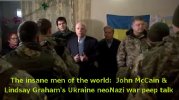Ukrainian President Petro Poroshenko became furious after a New York Times article criticized Ukraine for being embroiled in corruption and accused the US newspaper for waging “hybrid warfare” against Kiev, Ukrainskaya Pravda reported.
Poroshenko Offended After US Media Refers to Ukraine as 'Corrupt Swamp'
https://sputniknews.com/europe/201604031037417630-poroshenko-ukraine-corruption-us-media/
A few days ago, the New York Times published an article calling the level of corruption in Ukraine "unyielding.
The newspaper wrote that the US government must stop pouring money into a "corrupt swamp" that Ukraine has become unless its government implements some real changes to battle corruption.
Upon reading the article Poroshenko became extremely defensive and accused the New York Times of waging "hybrid warfare" to discredit his country.
"I'd like to be clear about this: today hybrid warfare is being waged against Ukraine, in particular, using the mechanisms of information distribution which discredit Ukraine," Poroshenko said, as cited by the newspaper Ukrainskaya Pravda.
Russian Foreign Ministry spokesperson Maria Zakharova didn't let Poroshenko's words pass unnoticed.
"Now Kiev should demand that the New York Times is included in some sort of sanctions list. Better American one," — Zakharova commented on Poroshenko's accusations at the newspaper, which had supported his government many times in the past.
The New York Times also called Poroshenko "a product of the old system" who "seems to have accepted continuing corruption as the price to pay for a modicum of maneuvering room."
Seems like the patience of the US government, which in the past has been very generous toward Ukraine, is beginning to thin out.
Since the overthrow of former Ukrainian President Victor Yanukovych, the US government has provided Ukraine with two loan guarantees worth $2 billion and hundreds of millions in other assistance.
Levels of corruption in Ukraine are extremely rampant. According to Gallup, 81 percent of the country's population believes corruption extensively affects Ukrainian businesses, while only 5 percent of people believe that the government is doing enough to fight corruption.
In 2015, Transparency International ranked Ukraine 142nd out of 175 investigated counties.
The real threat to Ukraine isn’t the Donbass militia, but widespread corruption in the Kiev government, market analyst and investment consultant Patrick Young told Radio Sputnik.
Corruption in Ukraine: West 'Won't Serve Kiev Anymore'
https://sputniknews.com/europe/201602231035220969-ukraine-corruption-west-money/
Ukraine has fallen off the radar as of recent, but a military conflict between Kiev and self-proclaimed independence republics in the eastern part of the country is far from over. However, it's not independence supporters that would bring Kiev down, it's the country's inability to get rid of corruption.
"It's not a question of being allied to East or West, it's not a question of a particular type of politics, but it's the fact that fundamentally, at its core, Ukraine demonstrated no interest whatsoever in delivering a fair and reasonable state of law," Young told Radio Sputnik.
Fighting corruption in Ukraine isn't a question of time, but it's a "matter of mindset," the expert explained, adding that the Ukrainian leadership hasn't shown any signs that the situation with corruption would get better any time soon.
Not a single Ukrainian leader has shown the capacity and desire to genuinely reform the country and fight corruption. The only objective has been to pretend to fix policies in a way that will allow Kiev to get more funding from the West, Young said.
Germany's Ambassador to the United States, Peter Wittig, is one of the high-profile politicians who figured out that Ukraine's main problem is corruption.
If Ukraine fails to modernize and reform its economy and corruption isn't tackled, Western investors won't go to Ukraine, as nobody goes to a country where there is a risk of getting involved in illegal business, Wittig said, according to USA Today.
"This is the case of Ukraine drinking its vodka in a town saloon and the bartender, in the shape of Mr. Wittig, the ambassador to Washington, has said ‘Really, we don't want to serve you anymore, you've got to pay for your bar tab now'… it's frustrating beyond belief," Young said.
Ukraine's leader again tried to scare the world by means of an alleged Russian threat.
Poroshenko Speaks of Threat of 'Full-Scale War' With Russia
https://sputniknews.com/europe/201702221050948197-poroshenko-ukraine-russia-war/
Ukrainian President Petro Poroshenko said Wednesday that there was a threat of a full-fledged war with Russia.
"The Russian military forces in the southeast, in Transnistria in Moldova, too, in my opinion, may at any time be used for attacking our territory, and threaten our borders … The threat of a full-scale war on Russia's part has not disappeared," Poroshenko said at a meeting of the leadership of the Ukrainian Armed Forces.
He also accused Russia of building up its military presence in Crimea.
Kiev deliberately has protracted the talks over the Minsk agreements, according to Natalia Nikonorova, Foreign Minister of the self-proclaimed Donetsk People's Republic (DPR). Speaking to RT Russian political analyst Alexei Chesnakov, she assumed that Kiev wants international security forces brought in to eastern Ukraine to gain the upper hand.
Why Kiev's Shelling Raids on Donbass Coincide With Poroshenko's Foreign Tours
https://sputniknews.com/politics/201702171050794045-kiev-poroshenko-donbass/
Kiev used pauses in the negotiations of the Normandy Four and the Trilateral Contact group to sabotage the Minsk accords, Natalia Nikonorova, Foreign Minister of the self-proclaimed Donetsk People's Republic (DPR), told a press conference Thursday.
"Of all 13 paragraphs, which describe the whole set of measures necessary for the implementation of the Minsk accords, only one has been implemented [by Kiev] — to create subgroups," Nikonorova said as quoted by RIA Novosti.
She emphasized that although these political subgroups have really been created by Kiev, they are negotiators in name only, because very often Ukrainian representatives use various pretexts to block decision-making.
Furthermore, Nikonorova called attention to the fact that
Kiev continues to sabotage the implementation of the so-called "Steinmeier formula" proposed by former German Foreign Minister Frank-Walter Steinmeier back in 2015.
Under this formula the special status to Donbass will be assigned to the breakaway republics on the day of local elections in the Donetsk and Lugansk People's Republics.
She stressed that Kiev keeps protracting the talks. The Ukrainian leadership refuses to discuss the Steinmeier formula by referring to the necessity of receiving "additional signals" from the Normandy Four. It appears that it is in the interest of Kiev to stall the talks, she believes.
"Yesterday there was the 56th meeting of the political subgroups," Nikonorova said Thursday, "We prepared eight documents which were presented [to Kiev] back in April and May. [For its part], Ukraine has failed to work out any [document]. At the same time the [Ukrainian] subgroup has already replaced four negotiators over the past year."
Both DPR and LPR representatives have expressed their dissatisfaction with the OSCE Special Monitoring Mission, stressing that it doesn't exert enough pressure on Kiev.
"The OSCE is using extremely evasive [language] in its reports. They [OSCE] know much more than they say. They do not specify, at least presumably, who fired in the territory," LPR diplomat Rodion Miroshnik said, as quoted by RT.
DPR and LPR representatives voiced their growing concerns about the OSCE mission amid increased tensions between Kiev and the breakaway republics.
The situation in eastern Ukraine has escalated over the past few weeks, in particular near the town of Avdiivka, where clashes between Kiev forces and the local militia have intensified.
On January 29, fighting erupted in Avdiivka, Donetsk region.
Instead of de-escalating the conflict Kiev began to beef up its military presence near the town.
The Ukrainian army continues to concentrate its forces in the vicinity of Avdiivka for an offensive," Deputy Commander of the self-proclaimed Donetsk People's Republic (DPR) Operational Command Eduard Basurin reported on February 2.
A few days later the Russian Investigative Committee confirmed that Kiev was increasing its military presence along the contact line in Donbass.
In addition to shelling residential areas in Donbass, the Ukrainian Armed Forces carried out attacks against the region's infrastructure facilities: in particular, on February 4 the Ukrainian military blew up a power line near the city of Horlivka.
"The forces exploded the power line at 14:30 local time [11:30 GMT] on the territory controlled by Kiev, near the town of Svitlodarsk. As a result, the whole city of Horlivka was left without power," a spokesman for the self-proclaimed Donetsk People's Republic (DPR) reported.
Commenting on the issue, Alexei Chesnakov, the head of the Center for Political Analyses in Moscow, explained that back in May Kiev adopted a new tactic of destroying the region's infrastructure and industrial facilities.
"Ukraine wants to shift the focus from the discussion of the political process [in Donbass] to security issues," Chesnakov told RT, suggesting that this approach is being backed by US and EU decision-makers.
"This policy aimed at raising the problem of environmental and technological disasters is coordinated between Ukraine and the West," he explained.
"Kiev wants international security forces deployed in the region. Apparently, it is appropriate to talk about the United Nations, since the OSCE has no military force. This is a simple and primitive game," Chesnakov said, adding that Kiev hopes to win in few moves.
The Russian political analyst suggested that artillery raids on Donbass during Ukrainian President Petro Poroshenko's foreign tours are yet another element of Kiev's broader "game."
These activities [on the part of Kiev] are linked to the schedule of [Poroshenko's] foreign tours. If we connect the dots properly, we will see that the escalation is aimed at drawing Western politicians' attention to what is going on in Ukraine," Chesnakov said.
The question then arises whether such a strategy really helps Poroshenko to tip the balance in his favor in the eyes of Brussels and Washington.
Speaking to reporters last Friday Russian Foreign Minister Sergei Lavrov noted that the US and EU have begun to understand the true nature of Kiev's leadership.
"The only plus that I see in this situation, is that the West begins to understand the true nature of the Ukrainian authorities, but it is being achieved with blood and many months-long, if not years-long, experiments," Lavrov told the NTV channel.
Ukrainian President Petro Poroshenko said that the restoration of the Ukrainian air defense system in 2017 will become a vital priority for the country.
Kiev to Restore Air Defense System, Spend $333Mln on Arms Procurement in 2017
https://sputniknews.com/europe/201702221050946969-ukraine-budget-poroshenko/
Ukraine is planning to allocate almost $333 million on the development and procurement of weapons in 2017, while the restoration of national air defense system will become the main priority for the country, Ukrainian President Petro Poroshenko said Wednesday.
"This year 9 billion hryvnas will be allocated to the development and procurement of the new and modernized weapons and military equipment. Ukraine has never done that before," Poroshenko said at a session of the Ukrainian senior military officials.
The restoration of the Ukrainian air defense system in 2017 will become a vital priority for the country, the president added.
Only the two sides to the conflict in Donbass can agree on mediators to settling the conflict, Kremlin spokesman Dmitry Peskov said Wednesday in response to a mediation offer set out by the ex-president of Ukraine.
Only Kiev, Donbass Can Name Mediators - Kremlin on Yanukovych's Letter
https://sputniknews.com/europe/201702221050936515-ukraine-donbass-russia-yanukovych/
In a letter to world leaders obtained by Sputnik on Wednesday, ex-President of Ukraine Viktor Yanukovych offered his vision of how to settle the Donbas crisis.
"The role of mediator requires the consent of all parties to the conflict… Russia is not a party to this conflict, so Kiev and Donbass should first come together in this sense," Peskov told reporters.
Peskov, asked for comment on Yanukovych's letter, noted that Russia serves as the guarantor of the Minsk ceasefire agreements alongside its Normandy format partners Germany and France. 


